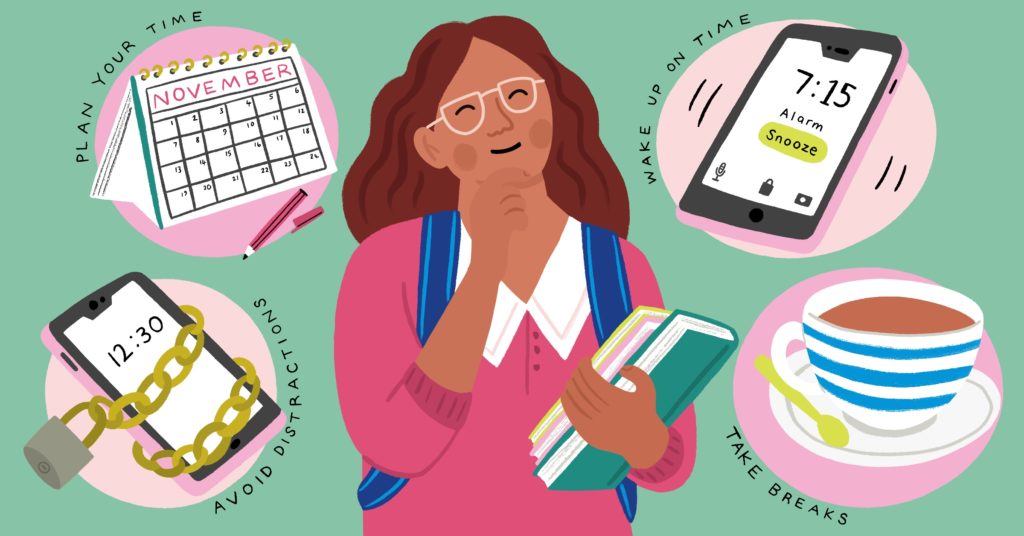
By Maria Romaszkan
The transition from K-12 education to college can be startling, especially for people with ADHD. While there are many things you might struggle with as a student with ADHD, being able to manage time may be one of the most challenging.
Not in college yet? Don’t worry; these tips will also help you in high school!
ADHD and time blindness
Time perception and ADHD have a rocky relationship at best. Time blindness makes it hard to gauge time and can manifest as:
- Feeling like time is constantly slipping away, and you have no control over it
- Being unable to estimate how long a task will take or how much time has passed
- Often being late to meetings or missing deadlines
- Losing track of time
- Having trouble with planning
Time management is a challenge because of other aspects of ADHD as well, like poor impulse control, distractibility or difficulty with motivation. It often leads to taking on too much or procrastinating, which results in too little time and too much stress.
How to better manage time as a student with ADHD
Experts offer some tips to students with ADHD that can help them better manage their time. Those tips include:
- Be realistic about your abilities
Be honest about what you can handle without pushing yourself. Don’t sign up for too many classes or those starting in the morning if you barely function before 10 a.m. You most likely can manage it for a whole semester, but you’re risking burning out completely. You need enough time to sleep and rest so you can stay healthy and better manage your ADHD symptoms.
“Set yourself up for success by scheduling your classes at times of the day when you find it easiest to pay attention, and when you think you can get there on time,” clinical psychologist Mary Roney, PhD, writes in an article for the non-profit Child Mind Institute’s website.
- Find a planner that works
How often have you heard someone suggest: “Just use a planner”? If only it were that easy. But don’t immediately give up on the idea. Consider using a digital calendar and having a whiteboard or printable calendar placed somewhere visible so you can always check your schedule. You can also try color coding to better organize and prioritize the tasks and appointments.
- Alarms and reminders
A big plus of digital calendars is setting reminders and alarms — as many as you want. We almost always have a phone or a smartwatch on us, so it’s unlikely we’ll miss that reminder about medication or a study group meeting.
- Add some buffer time
If it’s difficult to estimate how much time you need for a task, it’s better to err on the side of caution. Set your own deadlines a few days before the actual ones. That should give you enough time to finish the assignment, even with potential procrastination.
It saves you a lot of stress, and you finish work a few days early.
- Try the Pomodoro technique
Deciding on time, not results, can make starting work and scheduling easier. Don’t try to write the whole essay — that could take hours and lead to frustration or procrastination. Decide to write for one hour instead, or even just 15 minutes.
The Pomodoro technique is excellent for such time-based goals. It’s simple yet effective: you have a period during which you work, and then you have a break. Usually, it’s 25 minutes of working and five minutes of rest. It could be longer or shorter — test what works for you. The important thing is to be able to focus during that set time.
- Break tasks into smaller steps
For people with ADHD, having a to-do list with general tasks can be overwhelming. Instead, try to break tasks down into smaller ones. “I need to know exactly what steps I will be taking to start the … process. And I need the checklist to refer to when I get stuck or distracted,” says Tyler Dosey, ADHD coach, in her recent article for the ADHD Online blog about creating lasting habits.
These steps can be as tiny or detailed as you like. It’s about your comfort and finding the motivation actually to get them done. You don’t have to do everything on the list at once. It can be easier to do just one thing today.
If you find detailed lists paralyzing, try writing down just the first few steps to help you get going.
- Do some shadow work
Shadowing or body doubling means working while having company. Don’t hesitate to ask your partner, roommate or friend to hang out. They can read a book, nap or also tackle their assignments. The important thing is to be together. Of course, you can arrange a video call as well.
You can also look for an accountability buddy on campus or online, sign up for a study group or create one with your friends or people from the same class.
- Apply for accommodations
Two federal laws require K-12 schools to create special plans for students who need special education help, including kids with ADHD. One law requires an Individualized Education Program, or IEP, for each special education student. A separate law requires something called a 504 Plan for certain students.
Neither of these laws apply to college education. But that doesn’t mean you’re left with no options. There are still many accommodations that you can ask for from your college or college instructor. They can help you better manage your time and workload. A couple possible accommodations: extended deadlines for certain assignments, or assistance with lecture notes and recordings.
Sources:
Child Mind Institute: Tips for Going to College With ADHD
Attention Deficit Disorder Association: Recommended Accommodations for College Students with ADHD







